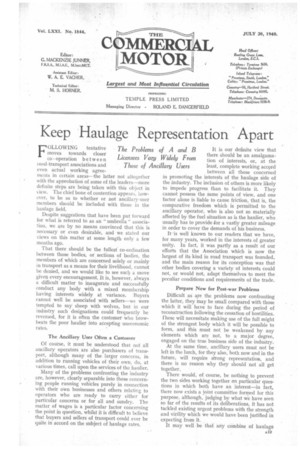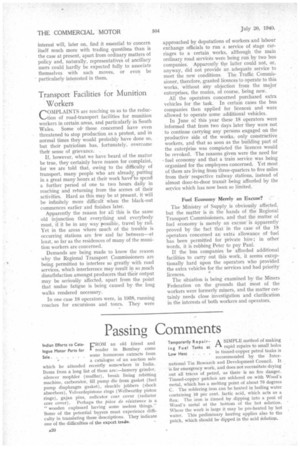Keep Haulage Representation Apart
Page 21

Page 22

If you've noticed an error in this article please click here to report it so we can fix it.
FOLLOWING tentative moves towards closer co-operation between road-transport associations and even actual working agreements in certain areas—the latter not altogether with the approbation of some of the leaders--more definite steps are being taken with this object in view. The chief bone of contention appears, however, to be as to whether or not ancillary-user members should be included with those in the haulage field.
Despite suggestions that have been put forward for what is referred to as an "umbrella association, we are by no means convinced that this is necessary or even desirable, and we stated our views on this matter at some length only a few months ago.
That there should be the fullest co-ordination between those bodies, or sections of bodies, the members of which are concerned solely or mainly in transport as a means for their livelihood, cannot be denied, and we would like to see such a move given every encouragement. It is, however, always a difficult matter to inaugurate and successfully conduct any body with a mixed membership having interests widely at variance. Buyers cannot well be associated with sellers—we were tempted to say sheep with wolves, but in our industry such designations could frequently be reversed, for it is often the customer who browbeats the poor haulier into accepting uneconomic rates.
The Ancillary User Often a Customer Of course, it must be understood that not all ancillary operators are also purchasers of transport, although many of the larger concerns, in addition to running vehicles of their own, do, at various times, call upon the services of the haulier.
Many of the problems confronting the industry are, however, clearly separable into those concerning people running vehicles purely in connection with their own businesses and others relating to operators who are ready to carry either for particular concerns or for all and sundry. The matter of wages is a particular factor concerning the point in question, whilst it is difficult to believe that buyers and sellers of transport could ever be quite in accord on the subject of haulage rates. It is our definite view that there should be an amalgamation of interests, or, at the least, complete working accord between all those concerned in promoting the interests of the haulage side of the industry. The inclusion of others is more likely to impede progress than to facilitate it. They cannot possess the same points of view, and one factor alone is liable to cause friction, that is, the comparative freedom which is permitted to the ancillary operator, who is also not so materially affected by the fuel situation as is the haulier, who usually has to provide or a vastly greater mileage in order to cover the demands of his business.
It is well known to our readers that we have, for many years, worked in the interests of greater unity. In fact, it was partly as a result of our efforts that the Association which is now the largest of its kind in road transport was founded, and the main reason for its conception was that other bodies covering a variety of interests could not, or would not, adapt themselves to meet the peculiar conditions and requirements of the trade.
Prepare Now for Post-war Problems Difficult as are the problems now confronting the latter, they may be small compared with those which it will have to face during the period of reconstruction following the cessation of hostilities. fhese will necessitate making use of the full might of the strongest body which it will be possible to form, and this must not be weakened by any elements which are not, to a major degree, engaged on the true business side of the industry.
At the same time, ancillary users must not be left in the lurch, for they also, both now and in the future, will require strong representation, and there is no reason why they should not all get together.
There would, of course, be nothing to prevent the two sides working together on particular questions in which both have an interest—in fact, there now exists a joint committee formed for this purpose, although, judging by what we have seen so far of the results of its deliberations, it has not tackled existing urgent problems with the strength and virility which we would have been justified in expecting from it.
It may well be that any combine of haulage Ala interest will, later on, find it essential to concern itself much more with trading questibns than is the case at present, apart from ordinary matters of policy and, naturally, representatives of ancillary users could hardly be expected fully to associate themselves with such moves, Or even be particularly interested in them.
Transport Facilities for Munition Workers
COMPLAINTS are reaching us as to the reduction of road-transport facilities for munition workers in certain areas, and particularly in South Wales. Some of those concerned have even threatened to stop production. as a protest, and in normal times they would probably have done so, but their patriotism has, fortunately, overcome their sense of grievance.
If, however, what we have heard of the matter be true, they certainly have reason for complaint, for we are told that, owing to the difficulty of transport, many people who are already, putting in a great many hours at their work have(to spend a further period of one to two hours daily in reaching and returning from the scenes of their activities. Hard as this may be at present, it will be infinitely more difficult when the black-out commences earlier and finishes later.
Apparently the reason for all this is the same old injunction that everything and everybody must, if it be in any way possible, travel by rail. Yet in the areas where much of the trouble is occurring stations are few and far between—at least, so far as the residences of many of the munition workers are concerned.
Demands are being made to know the reason why the Regional Transport Commissioners are being permitted to interfere so greatly with road services, which interference may result in so much dissatisfaction amongst producers that their output may be seriouMy affected, apart from the point that undue fatigue is being caused by the long walks rendered necessary.
In one case 18 operators were, in 1938, running coaches for excursions and tours. They were approached by deputations of workers and labour exehange officials to run a service of stage carriages to a certain works, although the main ordinary road services 'were being run by two bus companies. Apparently the latter could not, or, anyway, did not provide an adequate service to meet the new conditions. The Traffic Commissioner, therefore, granted licences to operate to this works, without any objection from the major enterprises, the routes, of course, being new.
All the operators concerned purchased extra vehicles for the task. In certain cases the bus companies then applied for licences and were allowed to operate some additional vehicles.
In June of this year these 18 operators were informed that from two days later they were not to continue carrying any persons engaged on the productive side of the works, only constructive workers, and that so soon as the building part of the enterprise was completed the licences would be revoked. The reasons given were the need for fuel economy and that a train service was being organized for the employees concerned. Yet most of them are living from three-quarters to five miles from their respective railway stations, instead of almost door-to-door transit being afforded by the service which has now been so limited.
Fuel Economy Merely an Excuse?
The Ministry of Supply is obviously affected, but the matter is in the hands of the Regional Transport Commissioners, and that the matter of fuel economy is merely an excuseis apparently proved by the fact that in the case of the 18 operators concerned an extra allowance of fuel has been permitted for private hire ; in other ivords, it is robbing Peter to pay Paul.
If the bus companies be afforded additional facilities to carry out this work, it seems exceptionally hard upon the operators who provided the extra vehicles for the services and had priority licences.
The situation is being examined by the Miners Federation on the grounds that most of the workers were formerly miners, and the matter certainly needs close investigation and clarification in the interests of both workers and operators.




























































